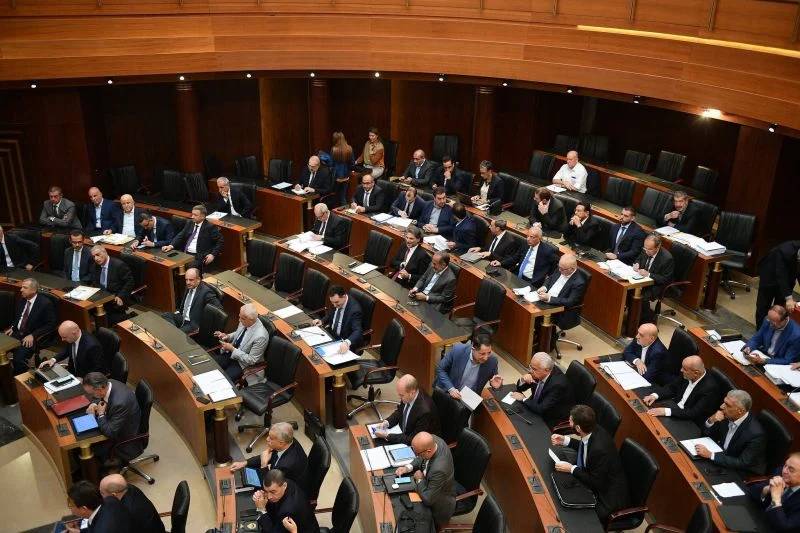
A meeting of the Lebanese Parliament on Sept. 26, 2022 in Beirut. (Credit: Ali Fawaz/Lebanese Parliament/Flickr)
A majority of Lebanese MPs will attend today’s parliamentary session to elect a new president, surpassing the two-thirds quorum needed to convene the session. The Ahbash bloc, Amal Movement, Forces of Change, Free Patriotic Movement, Hezbollah, Independent National bloc, Lebanese Forces, National Moderation bloc (former Future Movement MPs), Renewal Bloc, and Tashnag MPs all confirmed their attendance. Security forces announced the area surrounding Parliament will be closed from 7 a.m. until the end of the session. During the first round of elections, candidates require a two-thirds majority vote — 86 out of Parliament’s 128 MPs — to progress to the next round of voting. In any subsequent sessions, only a simple majority of 65 votes is needed to elect a president. In previous elections, Hezbollah and allied MP truancy stalled the election of a president for two years by preventing Parliament from reaching quorum. While popular opinion has assumed Marada leader Sleiman Frangieh, Free Patriotic Movement leader Gebran Bassil and Lebanese Forces leader Samir Geagea would be brought as candidates, MPs have not announced a consensus on President Michel Aoun’s successor. FPM MPs will cast blank votes, bloc head Gebran Bassil announced yesterday. Lebanese Forces MP Georges Adwan announced his intent to unify “opposition forces’” votes. Forces of Change MP Paula Yacoubian said the group met yesterday evening to “make the final decision on the selection of a candidate.” Forces of Change MPs met earlier this month with several parliamentary bloc MPs, with reportedly positive results and the common goal of preventing a presidential vacancy. “I have fulfilled my duties as parliament speaker,” said legislative head Nabih Berri, explaining his scheduling of today’s vote. President Aoun’s mandate ends on October 31.
The official lira-to-dollar exchange rate will increase tenfold to LL15,000 beginning November 1, mirroring the rate adopted in the 2022 budget, caretaker Finance Minister Youssef Khalil announced yesterday. The new rate "has become urgent to correct the impact of the abrupt collapse of the official exchange rate and the multitude of rates in force, the Finance Ministry said in a statement. The parallel market exchange rate hovered close to LL39,000 to the dollar Wednesday night, while Banque du Liban’s exchange platform — the Sayrafa rate — was almost at LL30,000. The Finance Ministry’s statement also acknowledged “the unification of the exchange rate” as a necessity, echoing the International Monetary Fund’s demand that Lebanon solely enforces the Sayrafa rate. So far, the Ministry has not clarified the practical implications of the exchange rate shift.
Bodyguards of MP Mohammad Nabil Badr fought with an army intelligence officer over a parking space in front of Blom Bank’s main branch in the Verdun neighborhood of Beirut yesterday. The brawl “happened outside the bank’s premises and the bank has nothing to do with it,” a Blom spokesperson told L’Orient Today. Banks partially reopened Monday with reinvigorated security measures after a weeklong closure to protest the previous week’s nine holdups, when depositors attempted to forcibly withdraw their own funds. Badr mediated a holdup in the Tariq al-Jadideh neighborhood of Beirut, escorting into custody the empty-handed Abed Soubra who, unarmed, had refused to leave without his funds. A Blom spokesperson later told L’Orient Today that an agreement was reached between the bank and Soubra, who was released on bail five days after his arrest. On Monday, a depositor scuffled with security personnel after attempting to forcibly enter a southern Lebanon branch of Blom Bank, which limited access to one customer at a time. Blom Bank CEO Saad Azhari blamed the break-ins on Lebanese authorities’ failure “to adopt the urgent measures necessary” since the onset of the crisis, namely, a capital controls law.
Fuel prices increased slightly, as 20 liters of 95 and 98-octane gasoline rose by LL27,000, reaching LL677,000 and LL698,000, respectively. The same quantity of diesel rose by LL34,000, reaching LL810,000. A gas cylinder now costs LL397,000, up by LL11,000. Fuel prices have been following the lira-to-dollar exchange rate more closely since the complete removal of fuel subsidies earlier this month. Gas Station Owners’ Syndicate spokesperson Georges Brax called for stations’ rights to price fuel in US dollars so they can avoid “confusion” and “large losses” caused by fluctuations in the exchange rate. According to a study published by the Center for Lebanese Studies at the Lebanese American University, the average price of gas is only $3 less than the average teacher's monthly income. Fuel prices have consistently recorded the greatest yearly increase among consumer products, latest inflation figures show.
In case you missed it, here’s our must-read story from yesterday: “‘Kash Kash’: Filmmaker Lea Najjar reflects upon pigeons and ghosts, liars and collaborators”
Compiled by Abbas Mahfouz